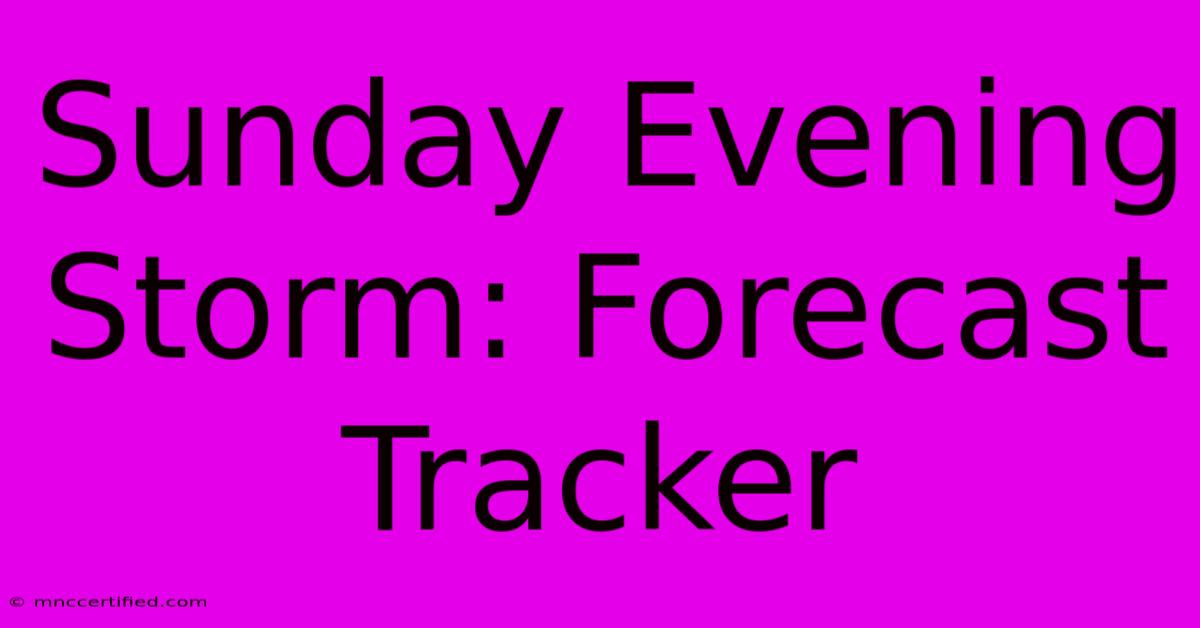Sunday Evening Storm: Forecast Tracker

Table of Contents
Sunday Evening Storm: Forecast Tracker & Safety Guide
Sunday evenings are often associated with relaxation and winding down, but a sudden storm can quickly disrupt those plans. This article serves as your guide to tracking Sunday evening storms, understanding the associated risks, and ensuring your safety. We'll cover everything from reliable forecast sources to essential preparedness steps, ensuring you're well-informed and prepared, no matter the weather.
Tracking the Sunday Evening Storm: Your Resource Guide
Accurately tracking a Sunday evening storm requires access to reliable and up-to-date information. Here's a breakdown of your best resources:
1. National Weather Service (NWS): Your Primary Source
The National Weather Service (NWS) is the gold standard for weather information in the United States. Their website (weather.gov) provides detailed forecasts, warnings, and advisories at a hyperlocal level. Pay close attention to:
- Severe Thunderstorm Warnings: These indicate that a severe thunderstorm is imminent or occurring. Take immediate shelter!
- Tornado Warnings: This is the most serious warning. Seek immediate shelter in a sturdy interior room away from windows.
- Flash Flood Warnings: These indicate rapid flooding is occurring. Avoid driving through flooded areas.
2. Reputable Weather Apps: Convenient and Accessible
Numerous weather apps offer detailed forecasts and real-time updates. Popular and reliable options include:
- The Weather Channel: Offers detailed radar imagery, forecasts, and severe weather alerts.
- AccuWeather: Provides highly localized forecasts and customizable alerts.
- NOAA Weather: The official app from the National Oceanic and Atmospheric Administration, mirroring the NWS website.
Pro Tip: Choose one or two reliable apps and stick with them to avoid conflicting information.
3. Local News Channels: Ground-Level Reporting
Your local news channels are valuable resources, particularly during active weather events. They provide on-the-ground reports, traffic updates, and critical information specific to your area.
Understanding Sunday Evening Storm Risks
Sunday evening storms can pose unique challenges:
- Reduced Visibility: Darkness significantly reduces visibility, making driving extremely hazardous.
- Increased Traffic: People are traveling home from weekend activities, leading to congested roads and increased accident risks.
- Power Outages: Storms can easily knock down power lines, leaving you without electricity at a time when many are at home.
- Flash Flooding: Heavy rainfall in a short period can lead to rapid and dangerous flash floods.
Preparing for a Sunday Evening Storm: Safety First
Preparation is key to minimizing risks. Here's a checklist:
- Charge your devices: Ensure your phone, tablet, and other electronics are fully charged.
- Gather emergency supplies: Have a kit ready with flashlights, batteries, water, non-perishable food, and first-aid supplies.
- Secure outdoor items: Bring loose items indoors, such as patio furniture, grills, and trash cans, to prevent damage.
- Know your shelter plan: Identify a safe room in your home, away from windows, where you can shelter during a severe storm.
- Monitor the forecast: Stay updated on the latest weather information leading up to and during the storm.
- Avoid unnecessary travel: If a severe weather warning is issued, stay off the roads.
Beyond the Forecast: Long-Term Weather Awareness
Staying informed about weather patterns beyond just Sunday evenings is crucial for overall safety and preparedness. Regularly check forecasts and be aware of seasonal risks in your area. This proactive approach will significantly reduce your vulnerability to unexpected storms and other weather-related events.
This comprehensive guide empowers you to navigate Sunday evening storms safely and efficiently. Remember: preparation and awareness are your best defenses. By utilizing the resources mentioned and following the safety tips provided, you can significantly reduce the risks associated with severe weather.

Thank you for visiting our website wich cover about Sunday Evening Storm: Forecast Tracker. We hope the information provided has been useful to you. Feel free to contact us if you have any questions or need further assistance. See you next time and dont miss to bookmark.
Featured Posts
-
A12 Colchester Closed Northbound And Southbound Blocked
Nov 18, 2024
-
Packers Win Good Bad Ugly
Nov 18, 2024
-
Watch Italy Vs France Nations League Live
Nov 18, 2024
-
Metro Area Storm Risk Through Monday
Nov 18, 2024
-
Dublin Airport Traffic Issue Alert Sounded
Nov 18, 2024